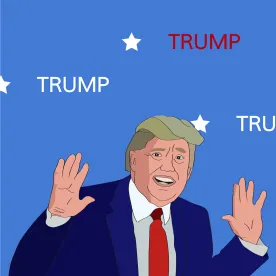The U.S. Supreme Court will consider if the U.S. Patent and Trademark Office’s (USPTO) refusal to register the trademark “Trump too small” violates the Free Speech Clause of the First Amendment.
The USPTO and Trademark Trial and Appeal Board refused to register attorney Steve Elster’s 2018 trademark application for “Trump too small” for use on shirts and hats because the mark references the name of a living individual, then-President Donald Trump, without that individual’s consent, in violation of Section 2(c) of the Lanham Act.
The Federal Circuit reversed in 2022, holding that application of Section 2(c) to bar registration of a mark that criticizes a public figure amounts to an unconstitutional content-based restriction on speech in violation of the First Amendment.
In its Petition to the Supreme Court, the USPTO argued that the Federal Circuit’s decision should be reversed, and the “Trump too small” trademark should be refused. The petition argues that this case would allow the Supreme Court clarify issues left open by Matal v. Tam, 147 S. Ct. 1774 (2017), which held that Section 2(a) of the Lanham Act’s prohibition on “disparaging” content violated the First Amendment, and Iancu v. Brunetti, 139 S. Ct. 2295 (2019), which held that Section 2(a) of the Lanham Act’s prohibition on “immoral” or “scandalous” material violated the First Amendment. The USPTO’s Petition argued that both Tam and Brunetti dealt with “viewpoint-based” prohibitions, whereas Section 2(c) is “viewpoint-neutral” and therefore does not violate the First Amendment.
In contesting the USPTO’s Petition, Mr. Elster argued that Section 2(c) in this context amounts to a content-based restriction on speech that cannot survive heightened constitutional scrutiny, and that Section 2(c) makes it virtually impossible to register a mark that expresses an opinion about a public figure.
Whether Section 2(c) violates the First Amendment is sidestepping a key issue such as whether or not this phrase is a single source indicator, which is the purpose of a trademark. Expressing an opinion about a public figure is one thing, registering a phrase that can act as a source indicator is another.
The Supreme Court will hear this case, Vidal v. Elster, 22-704, in its new term that begins in October, with a decision likely to follow in 2024.





 />i
/>i

